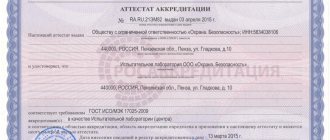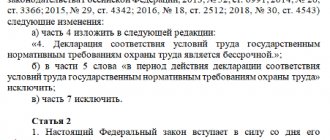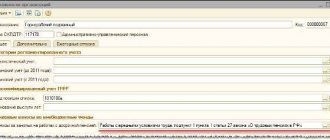Normative base
Federal Law of December 28, 2013 N 426-FZ “On Special Assessment of Working Conditions”
The procedure for conducting special labor assessments is enshrined in law and in some parts contains fairly liberal provisions. For example, according to paragraph 6 of Article 27 of Federal Law No. 426-FZ, for some workplaces a special assessment can be carried out in stages and must be completed by December 31, 2018. However, the courts have an ambiguous approach to the interpretation of this provision and make conflicting decisions (for example, Decrees No. 11-11968/2014 dated November 11, 2014 and No. 33-5865/15 dated February 26, 2015), and fines for failure to carry out this event can be up to 200 000 rubles.
SOUT: timing
A special assessment of working conditions must be carried out for the first time within a period not exceeding 12 months from the date of creation of a new workplace. If the organization has been operating for more than 12 months, and workplace certification (AWC) or a special assessment of working conditions has never been carried out, then a special assessment must be carried out immediately or yesterday.
In general, we recommend adhering to the rule that the period for carrying out special assessment and assessment at a new workplace is no more than 6 months from the date of its creation. This categoricalness is confirmed by law. Thus, according to Article 212 of the Labor Code of the Russian Federation, the employer is obliged to ensure:
- safe work of its employees;
- labor protection of its employees;
- informing workers about the conditions in which they work, etc.
At the same time, according to Article 219 of the Labor Code of the Russian Federation, the employee has the right to:
- safe working conditions;
- obtaining information about hazardous conditions in your workplace.
That is, the employee has the right to demand from the employer to provide information about the degree of risk to his health, which may be exposed to harmful or hazardous production factors (even sitting in front of a monitor screen). And if the employer does not provide him with such information, the employee has the right to receive this information contact the state supervisory authority for compliance with legislation.
In this case, the employer will face a fine of up to 80,000 rubles and a written order on the need to organize a special assessment. Otherwise, you may face administrative suspension of the enterprise for up to 90 days.
Reporting to the Social Insurance Fund
Table 10 “Information on the results of a special assessment of working conditions and mandatory preliminary and periodic medical examinations of workers at the beginning of the year” of Section II of the calculation in Form-4 of the FSS, starting with reporting for the first quarter of 2014, is filled out and submitted without fail (clause 2 Procedure for filling out form 4-FSS). This table has been updated due to the introduction of a special assessment of working conditions.
Table 10 reflects data on a special assessment of working conditions, as well as on mandatory preliminary and periodic medical examinations performed at the beginning of the year (clauses 34–34.4 of the Procedure for filling out form 4-FSS, approved by Order of the Ministry of Labor of Russia dated March 19, 2013 No. 107n). Moreover, if the policyholder’s workplace certification for working conditions has not yet expired, then the table must be filled out based on the results of such certification.
Frequency
The validity period of the special assessment of working conditions is 5 years. The passage of time begins from the date of approval of the assessment report for each individual workplace. The results of this event can be reduced to two options:
- no harmful factors were identified during the procedure;
- harmful factors are identified and classified accordingly.
No harmful factors identified
If during the special assessment no harmful and dangerous production factors are identified, such a workplace is subject to declaration to the territorial body of the federal service for labor and employment for compliance of working conditions with regulatory labor protection requirements.
In this case, if over the next 5 years there is no reason to conduct an unscheduled special assessment in relation to this workplace, then after this period there is no need to carry out a second assessment, the validity of the declaration is considered automatically extended.
And the law does not say in what time frame the SOUT needs to be done in the future (if it needs to be done at all).
Harmful factors identified and classified
In this case, the validity period of the special assessment of working conditions is 5 years. Moreover, this does not mean that five years have passed and we need to start organizing a new special assessment. By the end of the five-year period, the employer must have ready-made certification results, that is, no interruption is allowed.
Latest changes in legislation
Since the beginning of 2021, certain changes have been made. They imply the following points:
- The employer may require confirmation from the expert organization that information about the results is posted in the FSIS SOUT.
- The report must be supported by an enhanced electronic signature. It can be sent to the supervisory authorities not only in digital form, but also by mail with acknowledgment of receipt.
- It is possible to use the results of the SOUT, provided that the data is entered into the FSIS SOUT.
- The declaration is valid from the moment the data is loaded into the system, and not from the moment the report is approved.
The deadline for approval of the report is 30 calendar days from the date of receipt of the document from the expert organization.
Timing of unscheduled SOUT
If circumstances arise for conducting an unscheduled special assessment, the legislation provides for two time periods - 6 and 12 months, depending on the reason.
6 months
A special assessment of working conditions must be carried out within the specified time if:
- the employer received an order to conduct an unscheduled special assessment;
- in production they begin to use new materials or raw materials that can harm the health of the employee;
- new means of individual and collective protection are being introduced (the class of hazards can be reduced, and, accordingly, payments for hazards can be reduced);
- an accident occurred (except for an industrial accident caused by third parties);
- the medical commission has established the fact of an occupational disease;
- A letter was received from the trade union about the need to conduct an unscheduled special assessment.
12 months
The SOUT must be carried out within the specified time if:
- new jobs are being put into operation;
- technological processes and production equipment change, which can influence the level of exposure to harmful or dangerous production factors.
Employer mistakes.
Failure to conduct an unscheduled special assessment. As for its implementation, employers make various mistakes, as a result of which they are held accountable.
Thus, by the Decree of the Novosibirsk Regional Court dated 04/06/2016 in case No. 4a-262-2016, the decision of the GIT inspector and the court decisions to bring the JSC to administrative liability in the form of a fine in the amount of 60,000 rubles were left unchanged. for failure to conduct an unscheduled special assessment when commissioning newly organized workplaces within six months from the date of their commissioning in accordance with clause 1, part 1, art. 17 of Law No. 426-FZ.
By order of 08/04/2014, the position of grain loading machine operator was introduced into the staffing table of the OJSC, to which one of the employees was transferred by order of 10/09/2014. Thus, before 02/04/2015, the OJSC had to conduct a special assessment of this workplace. But since at the end of the six-month period this position was excluded from the staffing table, the employer considered that a special assessment of this workplace need not be carried out. However, he has already violated paragraph 1 of part 1 of Art. 17 of Law No. 426-FZ.
The court concluded that the subsequent exclusion of the position of grain loading machine operator from the staffing table does not relieve the OJSC from liability for committing an offense.
In another case, during the inspection, the GIT inspector identified violations committed by the MBOU, including the failure to conduct an unscheduled special assessment of working conditions at workplaces where production equipment (lighting fixtures) was replaced, which could have affected the level of exposure to harmful and ( or) hazardous production factors for workers. The resolution finding the employer guilty of committing an administrative offense provided for at that time in Part 1 of Art. 5.27 of the Code of Administrative Offenses of the Russian Federation, and the imposition of punishment in the form of an administrative fine in the amount of 40,000 rubles. the court only changed the amount of the fine (Resolution of the Chelyabinsk Regional Court dated June 25, 2015 No. 4a15-439).
The procedure for conducting a special assessment was violated. This may serve as a basis not only for bringing the employer to administrative liability. In addition, an employee whose rights were violated due to its implementation, by virtue of Art. 5 of Law No. 426-FZ has the right to appeal its results in court.
Thus, an employee (a neurosurgeon) filed a claim against the MAU “Central City Clinical Hospital” (hereinafter referred to as the Central City Clinical Hospital) to invalidate the results of a special assessment of the working conditions of her workplace.
The employee is obliged to familiarize himself with the results of a special assessment of working conditions carried out at his workplace.
Based on the results of this assessment, she was assigned a class (subclass) of harmful working conditions of 3.1, which excluded the right to provide her with additional leave. At the same time, the special assessment card did not include an assessment of working conditions for such a harmful (dangerous) factor as the intensity of the labor process, which, according to paragraphs. 2 p. 1 art. 13 of Law No. 426-FZ is subject to mandatory research (testing) and measurement. In addition, earlier, as a result of certification, her workplace was assigned a class (subclass) of harmful working conditions of 3.3, and therefore was granted an additional annual paid leave of 30 days. Her working conditions did not change.
By the decision of the court of first instance, the worker’s claim was denied, since the court considered that during the special assessment, such a factor as the intensity of the labor process was not subject to assessment: according to the job description, the plaintiff’s work activity does not correspond to the list of features of the labor process of employees contained in paragraph 23 .3 tbsp. 13 of Law No. 426-FZ. Therefore, there are no grounds for recognizing the results of a special assessment of working conditions as invalid.
However, the judicial panel did not agree with this conclusion. First of all, it was noted that, by virtue of Part 1 of Art. 3 of Law No. 426-FZ, special assessment is a single set of consistently implemented measures to identify harmful and (or) dangerous factors in the working environment and the labor process and assess the level of their impact on the employee, taking into account the deviation of their actual values from the established standards of working conditions and is carried out in accordance with a certain technique.
For your information
The methodology for conducting a special assessment of working conditions (hereinafter referred to as the Methodology), the classifier of harmful and (or) hazardous production factors, the form of the report on the special assessment of working conditions and instructions for filling it out were approved by Order of the Ministry of Labor of the Russian Federation dated January 24, 2014 No. 33n.
By virtue of clause 2, part 2, art. 13 of Law No. 426-FZ and clause 4 of the Methodology for the purpose of conducting a special assessment of working conditions, harmful and (or) dangerous factors of the labor process are subject to research (testing) and measurement, including the intensity of the labor process - indicators of sensory load on the central nervous system and employee's senses.
In addition, when implementing compensatory measures (reduced working hours, annual additional paid leave, monetary compensation) in relation to persons employed in jobs with harmful and (or) dangerous working conditions, the procedure and conditions for the implementation of such measures cannot be worsened, and the amounts are reduced in comparison with the procedure, conditions and amounts of compensation measures actually implemented in relation to these workers on the day of entry into force of Law No. 426-FZ, if working conditions at the workplace remained the same. This is stated in Part 3 of Art. 15 Federal Law of December 28, 2013 No. 421-FZ.
And finally, violations committed during the assessment were identified by the chief specialist of the labor protection department, who carried out a state examination of the quality of the special assessment of the working conditions of the neurosurgeon’s workplace based on the determination of the judicial panel.
The results of the special assessment were declared invalid (Appeal ruling of the Sverdlovsk Regional Court dated June 24, 2016 in case No. 33-6870/2016).
Incorrect application of the results of a special assessment. Situations are possible when an employer, when providing compensation to an employee for work in hazardous conditions, is guided only by the results of a special assessment. But this is not enough in all cases. The requirements of other federal laws should also be taken into account.
The employee filed a lawsuit against the FKUZ MSCh-10 of the Federal Penitentiary Service of Russia (hereinafter referred to as the FKUZ) to provide her with additional paid leave for 2015 in connection with the performance of the duties of paramedical personnel, work in hazardous conditions and in accordance with the Law of the Russian Federation of July 2, 1992 No. 3185 -1 “On psychiatric care and guarantees of the rights of citizens during its provision” (hereinafter referred to as Law No. 3185-1).
The employer, justifying its refusal to provide leave, indicated that according to the special assessment card, the plaintiff’s workplace has 2nd class working conditions, which, by virtue of the law, are safe; accordingly, she is not entitled to additional leave. In addition, the employee’s position is not included in the list of employees providing mental health care who are granted additional leave in accordance with Decree of the Government of the Russian Federation dated 06.06.2013 No. 482 (hereinafter referred to as Decree No. 482).
However, by a court decision, the claim was satisfied and the FKUZ was obliged to provide this medical worker involved in the provision of mental health care with additional annual paid leave for 2015, and here’s why.
The specified leave is provided to employees whose working conditions at their workplaces, based on the results of a special assessment, are classified as harmful of the 2nd, 3rd or 4th degree or dangerous (Article 117 of the Labor Code of the Russian Federation).
By virtue of Part 3 of Art. 350 of the Labor Code of the Russian Federation, certain categories of medical workers may be granted additional annual paid leave, the duration of which is established by the Government of the Russian Federation.
In accordance with paragraph. 1 and 2 hours 1 tbsp. 22 of Law No. 3185-1, medical and other workers involved in the provision of mental health care have the right:
- for reduced working hours;
- for annual additional paid leave for work with harmful and (or) dangerous working conditions in accordance with the legislation of the Russian Federation.
Law No. 3185-1 also provides that these guarantees are provided to those involved in the provision of psychiatric care to other employees of medical organizations subordinate to federal executive authorities, state academies of sciences, medical organizations subordinate to executive authorities of the constituent entities of the Russian Federation, as well as other employees from among civilian personnel military units, institutions and divisions of federal executive authorities, in which the law provides for military and equivalent service, are provided based on the results of a special assessment of working conditions (paragraph 4, part 1, article 22 of the law).
For your information
According to the list approved by Resolution No. 482, for medical workers involved in the provision of mental health care, nursing and junior medical personnel (except for medical statistics), the duration of the annual additional paid leave is 35 calendar days.
Having established that L. N. A. is a medical worker directly involved in the provision of psychiatric care (medical ward nurse of the psychoneurological department of the Federal Clinical Hospital), and guided by Art. 22 of Law No. 3185-1, Resolution No. 482, the court confirmed that the provision of leave based on the results of a special assessment is provided for other employees involved in the provision of mental health care, to which the plaintiff does not belong. At the same time, the emergence of the right to annual additional paid leave for work in harmful and (or) dangerous conditions for medical workers involved in the provision of mental health care does not depend on the class of working conditions established by the special assessment, which is provided for other employees of medical organizations in accordance with paragraph . 4 hours 1 tbsp. 22 of Law No. 3185-1.
The panel of judges agreed with these conclusions of the court of first instance (Appeal ruling of the Supreme Court of the Republic of Karelia dated March 11, 2016 in case No. 33-719/2016).
Shelf life of materials for special assessment of working conditions
Deadline for compiling a report on SOUT
It is established by order of the employer when organizing this event at the stage of forming the commission.
Shelf life of SOUT materials
It is 45 years, however, if, as a result of the special assessment and control system, harmful or dangerous production factors are identified and working conditions are appropriately classified according to harmfulness and danger, such materials must be stored for 75 years.
Validity period of SOUT materials
The materials based on the results of the special assessment are valid for the entire period of establishment of the corresponding hazard class or the validity period of the declaration of compliance of working conditions with state regulatory labor protection requirements.
What else can a fine be imposed for?
- Violation of the procedure for conducting SOUT:
- Failure by the employer to provide to the expert organization information characterizing working conditions in the workplace, as well as proposals from employees for identification at their workplaces (clause 2 of part 2 of Article 4 426-FZ)
Errors in creating a commission for special assessments, lack of a schedule for carrying out assessments (parts 1−4 of article 9 426-FZ)
- Absence of a list of jobs approved by the commission that are subject to SOUT or errors made in its preparation (Part 5 of Article 9 426-FZ)
- Carrying out SOUT during abnormal operating modes of the enterprise (clause 15 of the Methodology)
- Violation of deadlines when conducting SOUT:
- Violation of the deadlines for familiarizing workers with the results of the special labor assessment system, which reflects the working conditions at their workplaces (Part 5 of Article 15 426-FZ)
Violation of the deadlines for informing the expert organization about the approval of the report on the SOUT (Part 51 of Article 15 426-FZ)
- Violation of the deadlines for posting information about the results of the special assessment on the official website (if there is one) (Part 6 of Article 15 426-FZ)
- Violation of deadlines for filing declarations of conformity with GNTOT (Part 11 of Article 12 426-FZ)
- Failure to implement measures developed by expert organizations that could improve working conditions at the employer’s workplace.
Special assessment is a complex and labor-intensive process that requires the employer to have in-depth knowledge of the legislation on special labor safety standards, labor legislation, and other regulatory legal acts containing labor law standards and state regulatory requirements for labor protection. Therefore, the successful completion of a special assessment directly depends on the employer’s choice of an expert organization and their mutual work.







